Download dashboards in the Bold BI application
It is possible to download dashboards from tenants deployed on your server. Here is a step-by-step guide on how to download dashboards from sites in Bold BI:
Prepare dashboards for download
To download the dashboard(s) from site(s), follow these steps:
-
Click on
Actionsin the dashboard grid context menu, and then select theDownloadoption to download the corresponding dashboard.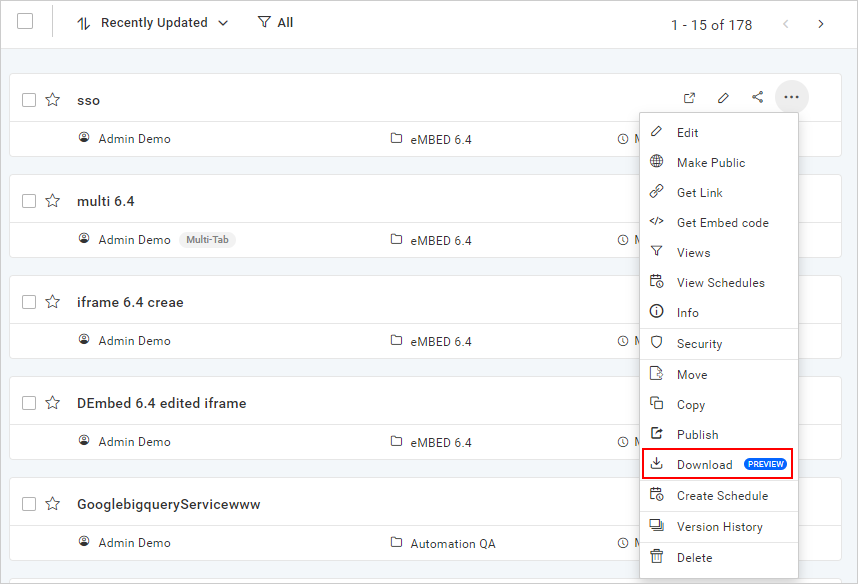
NOTE: If the download option for a particular dashboard is not visible in the context menu, this indicates that you don’t have the necessary permission to download it. Please refer to the download permission section to learn how to provide the download permission.
You can also download more than one dashboard from the page by selecting the dashboard list checkbox, or all dashboards on the page by selecting the
Select Allcheckbox in the header.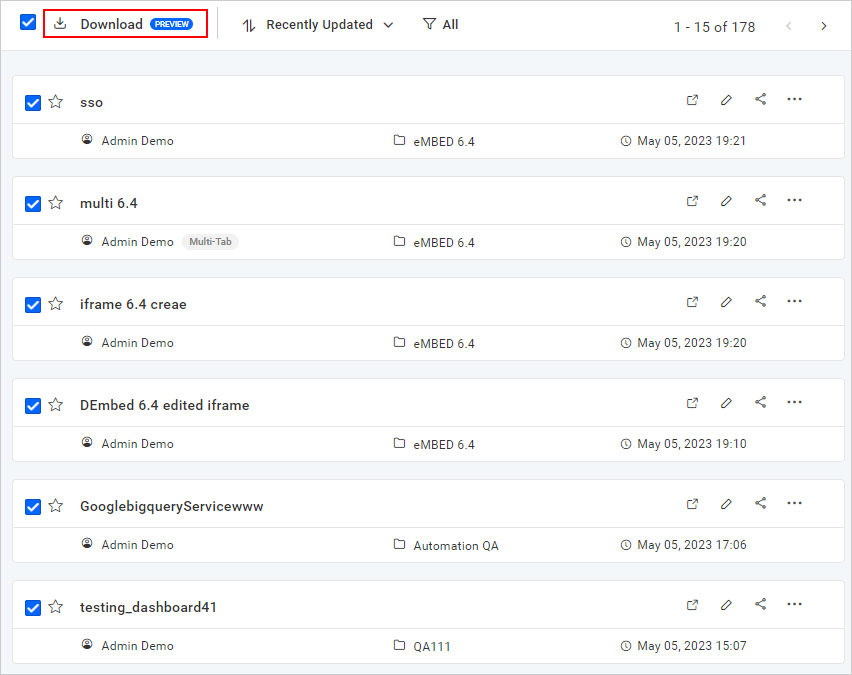
-
After clicking the
Downloadoption from the context menu or download icon, the dialog box will appear with description and warning message details. By default, theInclude sensitive informationcheckbox is selected, but you can uncheck it if you want.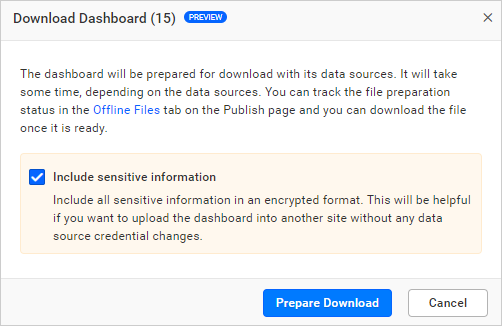
-
Click on the
Prepare Downloadbutton in the dialog to initiate the download request for the selected dashboards or individual dashboards. You can then check the status of the download process on the Offline Resources page.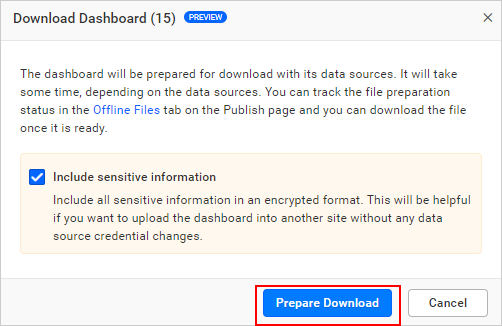
NOTE: The
Include sensitive informationincludes data source sensitive credentials. By enabling this option, you can download the dashboards with sensitive details, making it easier to upload them to another server without the need for additional configuration. This can save time and effort, as you can directly use the downloaded dashboards with all the necessary information.
Download the dashboard file from offline page
After the download process is complete, you can download the downloaded dashboards on the Offline Resources page. Here is how to download individual dashboard files or multiple dashboard files in a zip format:
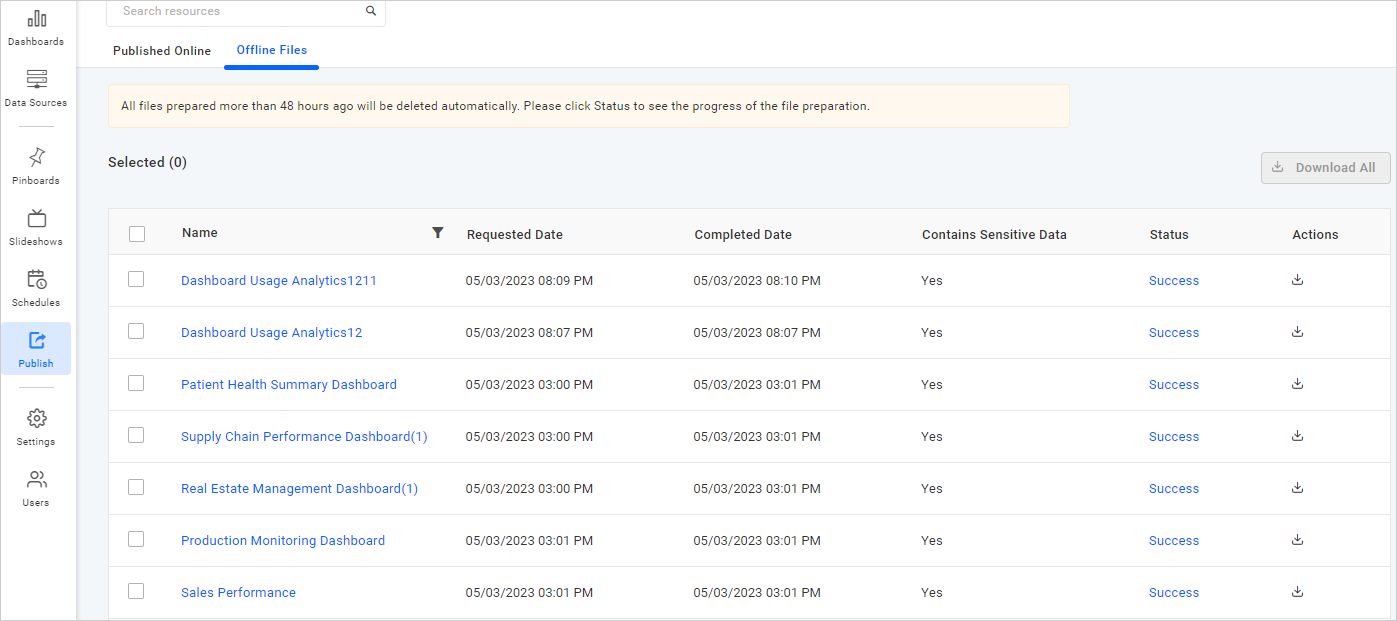
Download the dashboard file
To download the dashboard file, follow these steps:
-
Go to the Offline Resources page.
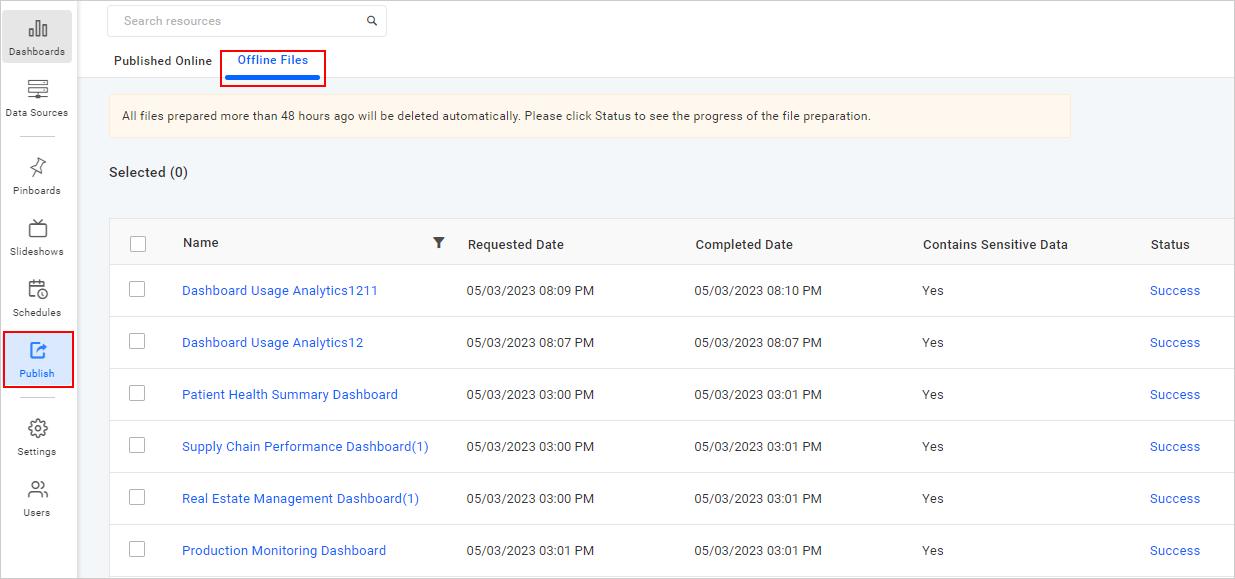
-
Click the download icon to download the corresponding dashboard.

You can download multiple dashboards by selecting their checkboxes, or select all dashboards on the page by clicking the
Select Allcheckbox in the header.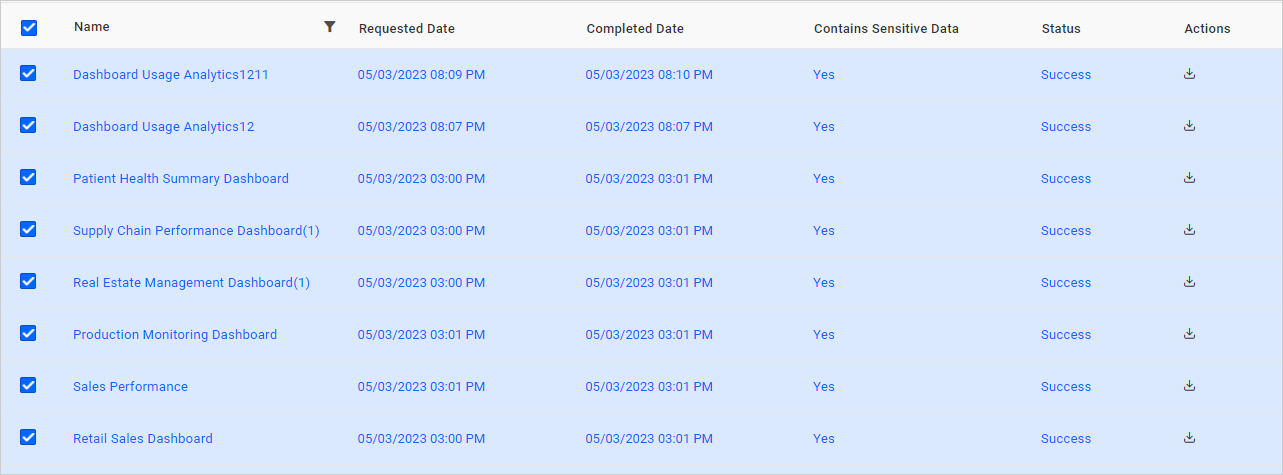
Then, click the
Download Allbutton at the top of the page to download the selected dashboard files.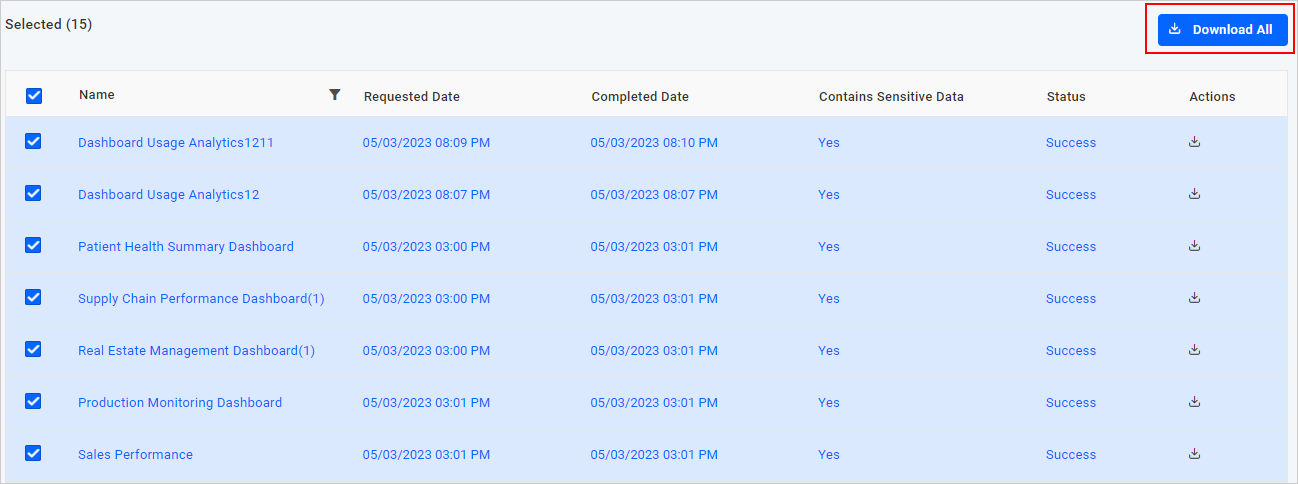
-
When downloading individual dashboards, the dashboard file with the extension
.bbixwill be downloaded. If you download multiple dashboards, a zip file containing the individual.bbixfiles for the selected dashboards will be downloaded.
Check the status of the downloaded dashboards
You can check the status of the downloaded dashboards by clicking the Status column on the Offline Resources page. This will show the status of the download process for each dashboard. Also, make sure to refresh the page to see the latest status updates.
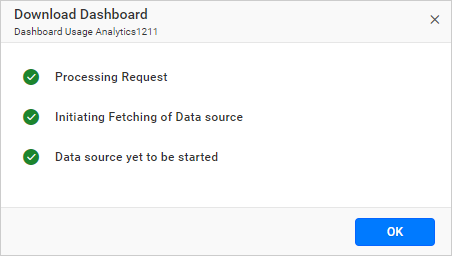
If any dashboard fails to download, you can view the reason for the failure by clicking on the Know More option in the dialog.
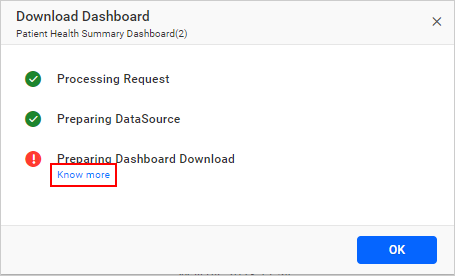
NOTE: If you come across a download failure error message associated with the download permission, it means that you do not have the required permission to download it. Please refer to the download permission section to understand how to grant the download permission.
Remove the download dashboard file from the offline page
Downloaded dashboard files can be removed from the Bold BI site by hovering over the respective file row and clicking the Remove option.
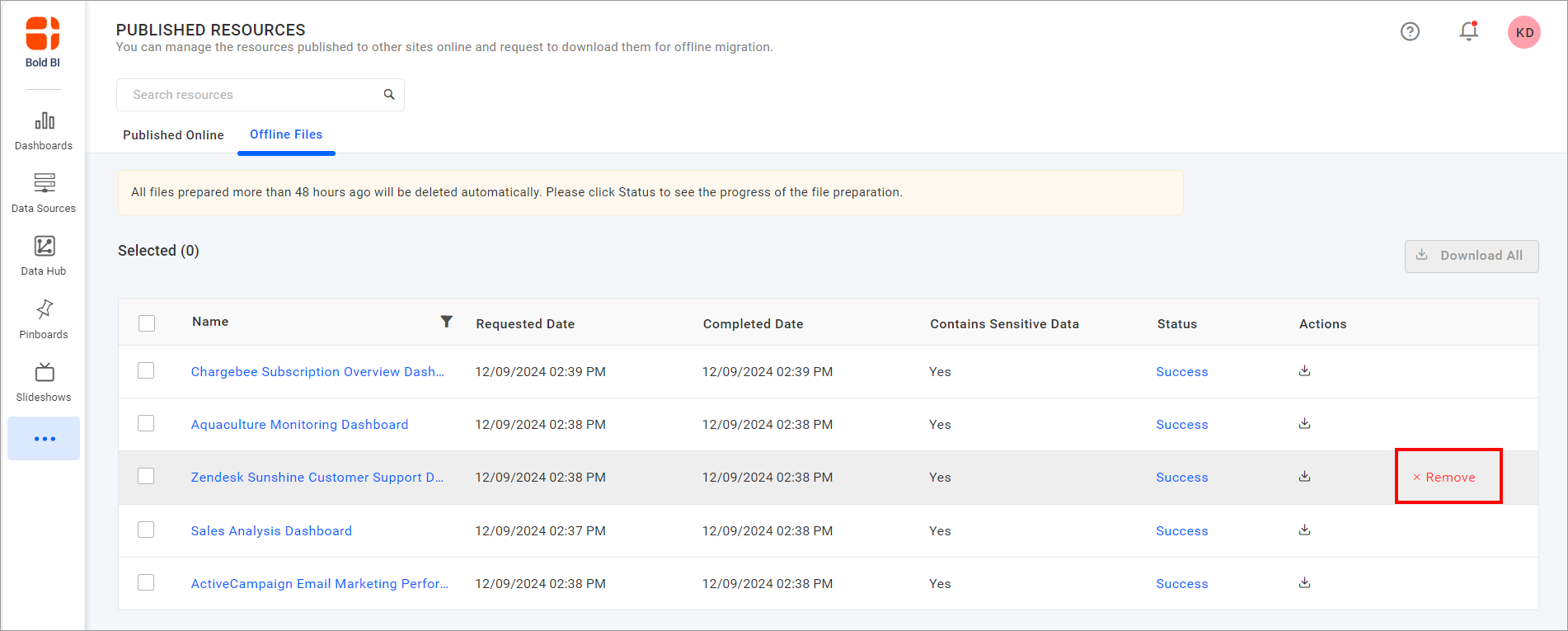
Download Permissions
By default, a user can only download their own dashboards. However, an administrator or a user with permission to delegate other permissions can grant download permission to other users for all dashboards, dashboards in a category, or specific dashboards. After the permission is granted, the user(s) will be able to download the dashboards from the tenants in Bold BI.
You can grant download permission to users in two ways: either from the Dashboards Listing page or from the Users and Groups Manage Permission page.
Granting download permission from the dashboard listing page
-
Click the
Share Permissionsoption in the Dashboards grid context menu.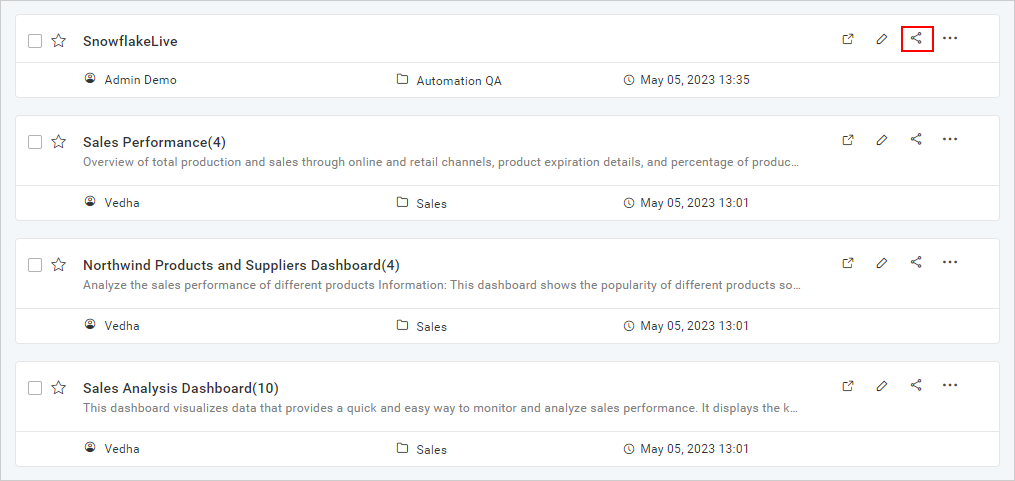
-
Select the download permission access and search for the users or groups in the search box, then click the
Sharebutton to provide the download permission for that dashboard.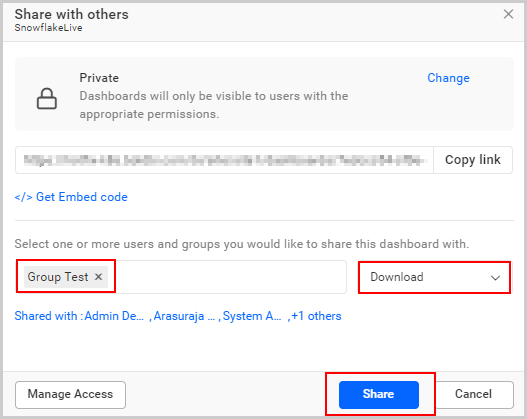
NOTE: Only the user who created the dashboard and the Administrator can share the dashboard with other Bold BI users.
Granting download permission from the users or groups manage permission page
-
Go to the
Userspage and click onActionsin the user management grid context menu. Then, select theManage Permissionsoption.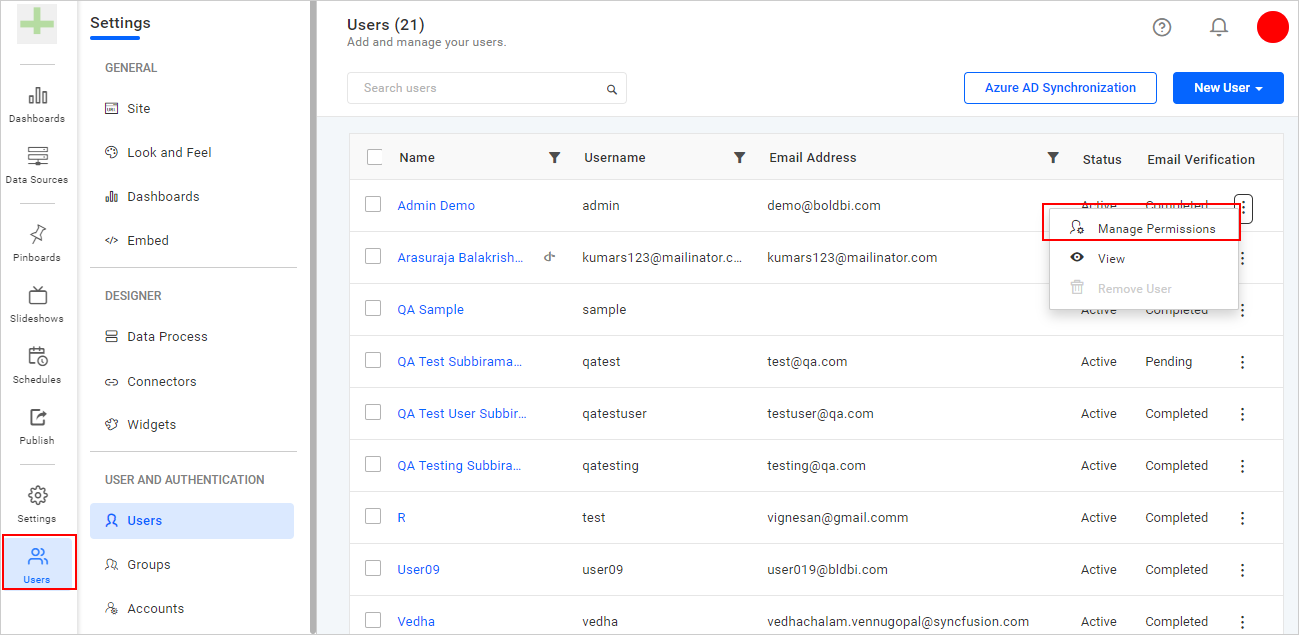
-
Click on the
Add Permissionbutton and select All Dashboards, Specific Dashboards, or Dashboards in the Category entity you want to grant the download permission for.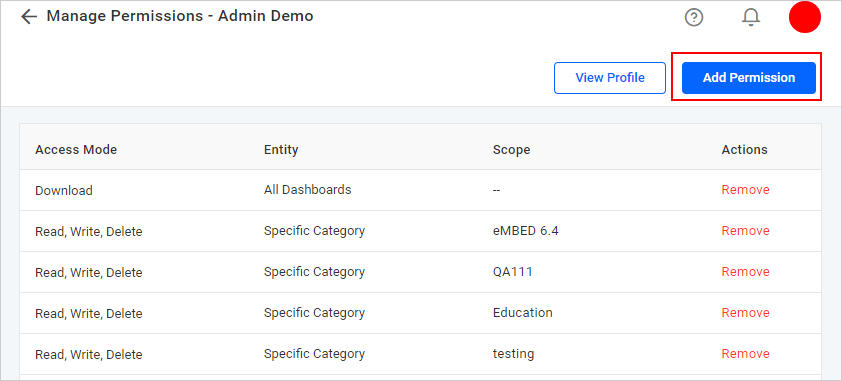
-
Select the
Downloadaccess mode and click theAddbutton to grant the user download permission.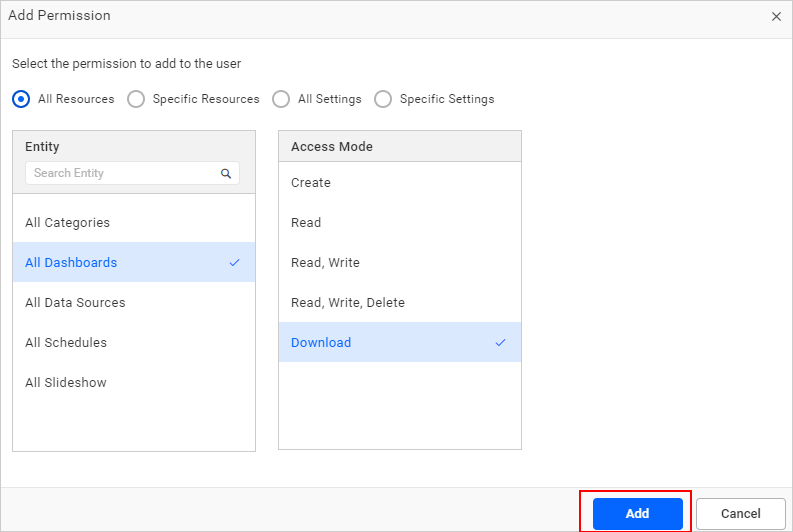
As previously outlined, the steps for granting download permissions to a user can be followed for a group as well. Navigate to the group listing page, select Manage Permissions for the desired group, and add the download permission.
Limitations of OAuth Data Sources
-
Dashboards created with data sources that have OAuth cannot be uploaded successfully at this time. The following is a list of data sources with OAuth that cannot be uploaded.
1.Asana 2.AzureDevOps 3.Bitly 4.Box 5.Buffer 6.DecisionLens 7.Dropbox 8.Facebook 9.FacebookAds 10.Fitbit 11.FreshBooks 12.Gmail 13.GoogleAds 14.GoogleAdsense 15.GoogleAnalytics 16.GoogleCalendar 17.GoogleDrive 18.GoogleSearchConsole 19.GoogleSheets 20.GoHighLevel 21.Keap 22.Instagram 23.LinkedIn 24.MicrosoftDynamicsSales 25.MicrosoftDynamicsSales 26.MicrosoftDynamicsService 27.MicrosoftOneDrive 28.MicrosoftOutlookCalendar 29.MicrosoftSharePoint 30.Podio 31.QuickBooks 32.QuickBooksPayments 33.Salesforce 34.SalesforceReports 35.Slack 36.Smartsheet 37.Todoist 38.Wistia 39.WordPress 40.Xero 41.Xero Workflow Max 42.Youtube 43.Zoho Books 44.ZohoCRM 45.ZohoInvoice
Limitations of features During Dashboard Upload.
We have added some limitations(Unsupported features) in uploading dashboards.
| Modules | Limitation |
|---|---|
| Google BigQuery | Regularly monitor the access token's validity and generate new tokens to maintain a smooth uploading experience
When uploading a Google BigQuery dashboard to other sites, it is essential to ensure that the respective sites have authorized access to the Google BigQuery data source This authorization process guarantees secure and authorized sharing of data between Google BigQuery and external sites |
| SQL | During the process of uploading a dashboard, attempting to change the mode of an SQL data source (e.g., from live to extract or extract to live) in the configuration editor will result in an exception |
| SQLite | Uploading a dashboard with SQLite data source in extract mode is not supported |
| Excel | Multiple Excel files are not supported |
| Combined data sources | Uploading a dashboard with Combined data sources is not supported |
| Shared data sources | Uploading a dashboard with shared table configured data sources is not supported |
| Common Features not supported | Code view mode data source is not uploading to a different IMDB (for on-premise only) Default dashboard parameters such as CURRENTUSER.EMAIL and CURRENTUSER.FULLNAME are not supported Customized expressions are not uploading to a different IMDB Custom attributes need to be configured on each site with the same names, otherwise, it fails Dashboards with renamed columns in the data source are not supported OAuth Data Sources require re-authorization on another site in the edit connection window Dashboard parameters with Custom query type are not supported Threshold and Data samplings are not supported Uploading a dashboard with shared table configured data sources is not supported Uploading a dashboard containing data sources in both live and extract modes is not supported |
- Prepare dashboards for download
- Download the dashboard file from offline page
- Download the dashboard file
- Check the status of the downloaded dashboards
- Remove the download dashboard file from the offline page
- Download Permissions
- Granting download permission from the dashboard listing page
- Granting download permission from the users or groups manage permission page
- Limitations of OAuth Data Sources
- Limitations of features During Dashboard Upload
- Prepare dashboards for download
- Download the dashboard file from offline page
- Download the dashboard file
- Check the status of the downloaded dashboards
- Remove the download dashboard file from the offline page
- Download Permissions
- Granting download permission from the dashboard listing page
- Granting download permission from the users or groups manage permission page
- Limitations of OAuth Data Sources
- Limitations of features During Dashboard Upload